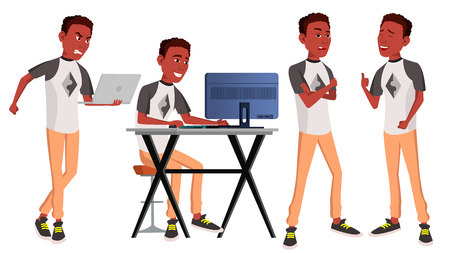Introduction to Current Workplace Trends in America
The American workplace is evolving rapidly, shaped by new technologies, shifting values, and global events. Understanding these changes is key for anyone making career decisions today. Let’s take a closer look at some of the major trends that are reshaping how people work in the United States.
Major Shifts in the Modern American Workplace
| Trend | Description | Impact on Careers |
|---|---|---|
| Remote Work | Many companies now offer flexible options to work from home or anywhere with an internet connection. | Broader job opportunities regardless of location; increased need for self-management and digital skills. |
| Gig Economy | A rise in freelance, contract, and short-term jobs instead of traditional full-time roles. | More flexibility and autonomy; less job security and fewer benefits. |
| Diversity and Inclusion | Employers focus more on building diverse teams and inclusive workplaces. | Greater emphasis on cultural awareness; opportunities for underrepresented groups. |
Remote Work: The New Normal
Since the COVID-19 pandemic, remote work has become standard for many industries. People can now live far from company headquarters and still collaborate daily with colleagues. This shift gives employees more control over their work-life balance but also requires strong communication and tech skills.
The Gig Economy: Flexibility and Independence
The gig economy is booming thanks to apps and online platforms connecting workers with short-term gigs. From driving for rideshare services to freelance graphic design, gig work offers freedom but often lacks stability. Many Americans enjoy setting their own schedules, but they must also manage their own taxes and benefits.
Diversity and Inclusion: Building Better Workplaces
Today’s companies are making diversity and inclusion a priority. They recognize that welcoming people from all backgrounds leads to better ideas and stronger teams. This means more training around bias, updated hiring practices, and open conversations about equality at work.
2. The Rise of Remote and Hybrid Work
How Remote and Hybrid Work Are Changing the American Workplace
Over the past few years, the way Americans work has undergone a dramatic shift. Remote and hybrid work models have moved from being rare options to becoming mainstream choices for many industries. With technology making it easier to connect from anywhere, more companies are embracing flexible work arrangements. This change is not just about where people work—it’s also changing how they work, collaborate, and balance their personal lives.
Key Differences Between Remote, Hybrid, and Traditional Work Models
| Work Model | Description | Main Benefits | Main Challenges |
|---|---|---|---|
| Traditional (Onsite) | Employees work full-time in an office or physical location | Face-to-face communication, easy team collaboration | Less flexibility, commuting stress |
| Remote | Employees work entirely from home or other locations outside the office | No commute, better focus, flexible hours | Potential isolation, harder team bonding |
| Hybrid | Combination of onsite and remote work days each week | Best of both worlds, increased flexibility, some in-person interaction | Complex scheduling, consistency issues |
Implications for Productivity and Work-Life Balance
The adoption of remote and hybrid work has real impacts on both productivity and how people manage their time at home and at work. Many workers find that they can focus better without the distractions of a busy office. Others appreciate being able to handle family responsibilities more easily when working from home. However, some people struggle with setting boundaries between their job and personal life, leading to burnout.
Positive Impacts:
- Increased Productivity: Less commuting means more time to get work done.
- Better Work-Life Balance: Employees can attend to personal needs without sacrificing job performance.
- Larger Talent Pool: Companies can hire talent from across the country.
Challenges to Consider:
- Communication Hurdles: Without face-to-face meetings, misunderstandings can happen.
- Team Building: It’s harder to build relationships when not everyone is in the same place.
- Self-Discipline: Working remotely requires strong time management skills.
The Impact on Career Choices in America
The shift toward remote and hybrid work is affecting what kinds of careers people pursue. Jobs that offer flexibility are becoming more attractive. Workers are also looking for employers who value results over simply being present in the office. As these trends continue, Americans may prioritize roles that support a healthy balance between professional success and personal well-being.

3. Technology and Digital Transformation
The Rise of AI, Automation, and Digital Tools
In today’s American workplace, technology is evolving at lightning speed. Artificial intelligence (AI), automation, and digital tools are changing the way people work across almost every industry. These advancements are not only making some tasks easier but also shifting what skills are in demand and opening up new career paths.
How Technology Is Changing Job Requirements
Employers now look for candidates who are comfortable with digital tools, can analyze data, or have experience with AI-powered platforms. Even jobs that once seemed “tech-free” now require some level of digital literacy. For example, customer service representatives might use chatbots to help answer questions, while marketing teams rely on data analytics software to track trends.
| Traditional Skill | Modern Tech-Driven Skill | Example Job Impacted |
|---|---|---|
| Data Entry | Data Analysis using AI | Administrative Assistant |
| Manual Inspection | Automated Quality Control Systems | Manufacturing Technician |
| In-Person Sales | Digital Marketing & E-commerce Tools | Sales Associate |
| Paper Filing | Cloud-Based Document Management | Office Manager |
New Career Opportunities Created by Technology
The digital transformation has also created entirely new roles that didn’t exist a decade ago. Careers like app development, cybersecurity analysis, and AI ethics consulting are now in high demand. Even in traditional fields like healthcare or education, there is a growing need for tech-savvy professionals who can implement telehealth solutions or manage online learning platforms.
Examples of Emerging Tech-Driven Careers:
- AI Specialist: Designing intelligent systems for businesses and consumers.
- Cybersecurity Analyst: Protecting companies from digital threats.
- User Experience (UX) Designer: Making websites and apps user-friendly.
- Remote IT Support: Helping employees troubleshoot tech issues from afar.
- E-commerce Manager: Overseeing online sales strategies for retail brands.
This shift toward technology-driven work means that continuous learning and adaptability are more important than ever for those planning their careers in the United States.
4. Diversity, Equity, and Inclusion in the Workplace
Understanding DEI Initiatives
Diversity, Equity, and Inclusion (DEI) have become essential values in American workplaces. Companies across the U.S. are investing more time and resources into building diverse teams, ensuring fair treatment, and fostering an inclusive environment where everyone feels they belong. This shift is not just about doing the right thing—it’s also about boosting business performance and attracting top talent.
Why DEI Matters in Today’s Workplaces
The growing emphasis on DEI initiatives is changing how businesses operate and how employees experience work. With a diverse workforce, companies can benefit from different perspectives, innovative ideas, and better problem-solving. Moreover, employees who feel included are often more engaged and productive.
How DEI Impacts Workplace Culture
| Aspect | With Strong DEI | Without Strong DEI |
|---|---|---|
| Team Collaboration | Open to new ideas; respectful communication | Limited perspectives; potential for bias |
| Employee Morale | Higher engagement; sense of belonging | Lower motivation; feelings of exclusion |
| Innovation | Diverse viewpoints spark creativity | Lack of innovation due to similar backgrounds |
The Impact on Career Progression
DEI initiatives are also influencing career choices and advancement opportunities. Many companies now offer mentoring programs, employee resource groups, and leadership development for underrepresented groups. As a result, professionals from all backgrounds can see clearer paths to promotion and leadership roles.
| Career Progression Factor | Traditional Approach | DEI-Focused Approach |
|---|---|---|
| Access to Opportunities | May depend on connections or background | Transparent criteria; equal access for all |
| Mentorship Programs | Limited or informal options | Diverse mentoring networks available |
The Bottom Line: What This Means for Job Seekers
If you’re choosing a career path or considering a job change in the U.S., it’s wise to look at how companies support DEI. Organizations with strong DEI values tend to offer better growth opportunities, more inclusive cultures, and higher employee satisfaction—factors that can positively shape your career journey.
5. Changing Career Paths and Skills in Demand
The American workplace is constantly evolving, and this has a big impact on how people choose their careers. As new technologies emerge and companies change the way they operate, certain jobs become more popular while others fade away. Understanding these trends can help you make smart decisions about your career path and the skills you need to succeed.
Shifts in Career Paths
Many Americans are now switching careers more often than ever before. Its becoming normal to move between different industries or job types as opportunities arise. Remote work, gig economy roles, and flexible schedules are making it easier for people to try new things without being tied down to one employer or location.
Popular New Career Directions
| Emerging Field | Why It’s Growing | Example Roles |
|---|---|---|
| Technology & IT | Digital transformation across industries | Software Developer, Cybersecurity Analyst |
| Healthcare | Aging population and health tech advances | Nurse Practitioner, Telehealth Specialist |
| Sustainability & Green Jobs | Focus on environmental impact | Renewable Energy Technician, Sustainability Manager |
| E-commerce & Digital Marketing | Growth of online shopping and digital business | E-commerce Manager, SEO Specialist |
| Remote Work Support Roles | Rise of remote teams needing coordination and support | Remote Project Manager, Virtual Assistant |
The Skills Employers Want Now
Employers are looking for people who have both technical know-how and strong “soft” skills. While job-specific abilities are important, being able to communicate well, solve problems, and adapt quickly matters just as much. Here are some skills that are especially valuable right now:
- Digital Literacy: Comfort with software tools, data analysis, and basic coding.
- Adaptability: Willingness to learn new things and pivot when needed.
- Communication: Clear writing, speaking, and digital collaboration skills.
- Cultural Awareness: Understanding diversity in global teams.
- Problem-Solving: Creative thinking to find solutions in fast-changing situations.
How to Stay Competitive in the Job Market
If you want to stay ahead in your career, keep learning! Online courses, certifications, and networking can help you build the skills employers want. Don’t be afraid to explore new fields—sometimes the best opportunities come from trying something different.


